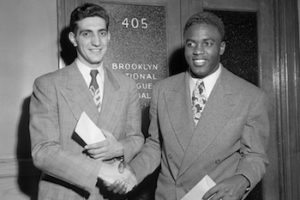
Ralph Branca and Jackie Robinson
*Ralph Branca was born on this date in 1926. He was a white Jewish-American professional baseball pitcher and civil rights activist through his friendship with Jackie Robinson against segregation in American professional baseball.
Ralph Theodore Joseph Branca was born in Mount Vernon, New York, as the fifteenth of seventeen children. His father was John Branca, a trolley car conductor from Italy. His mother, Kati (née Berger), was a Jewish immigrant from Sandorf, Hungary. His uncle Jozsef Berger was killed at the Majdanek concentration camp, and his maternal aunt Irma died at the Auschwitz concentration camp in 1942. Branca graduated from A. B. Davis High School; he attended and played college baseball and college basketball for New York University (NYU).
After a tryout with the Brooklyn Dodgers in 1943, he was signed to a contract and debuted on June 12, 1944, and put up a 3.04 earned run average (ERA) in 109 2⁄3 innings pitched in his rookie year. On Opening Day in 1947, which was also Jackie Robinson's major league debut, Branca lined up on the field beside Robinson, while other players refused. That year, he had a 21-12 win-loss record and a 2.67 earned run average (ERA) in 280 innings pitched. He earned his first All-Star appearance and helped the Dodgers win the National League pennant. He was second in the league in wins, innings pitched, and strikeouts (148), third in ERA, and sixth in won-lost percentage (.636).
Branca and Robinson started to get acquainted during an exhibition game the previous week when Robinson, then a minor-league member of the Montreal Royals, mumbled a word of gratitude to the Branca while passing by the mound. He thought Robinson might be thanking him for grooving a fastball. Soon enough, he realized Robinson was thanking him for refusing to sign a teammate's petition to keep the Dodgers as white as the first-base line. This was the start of a lifelong friendship that didn't last nearly long enough; Robinson died in 1972, at 53, shortly after appearing at the 1972 World Series and calling on the game's elders to hire black managers. Branca was a pallbearer at his funeral at New York's Riverside Church, and he remained a loyal advocate for Rachel Robinson, who started a foundation in her husband's name.
In 1997, when people of all colors and creeds couldn't do enough to celebrate the 50th anniversary of Robinson's breakthrough, Rachel said this about the man who helped Jackie navigate his way around the racism in his clubhouse and the taunts from opposing players, managers, and fans: "Ralph Branca was good to my husband when it wasn't fashionable to be good to him." After playing, Branca and his wife Ann would take their two daughters, Patti and Mary, to the home Robinson shared in Stamford, Connecticut, with his wife Rachel and their three kids. Mary recalled playing with the Robinsons' daughter Sharon in the yard at a time in America when the sight of white and black girls playing together was not what anyone would call common. Branca often said he felt Jackie Robinson did even more than Dr. Martin Luther King Jr. for African Americans, and his argument was simple: Robinson had come along first.
Branca understood that Southern players such as Dixie Walker and Bobby Bragan were facing intense pressure from friends and family back home that couldn't grasp the thought of a black man as an equal. Branca wished they'd grown up in his integrated community of Mount Vernon, New York. "Living and playing with blacks," he said, "was part of my life." Branca ate with Robinson when others wouldn't, and he convinced the rookie to take postgame showers with his fellow Dodgers even though some didn't want him in the same room. "Jackie was all alone," Branca said. "I was only doing what I was taught to do." Branca played 12 seasons in Major League Baseball. He played for the Brooklyn Dodgers (1944–1953, 1956), Detroit Tigers (1953–1954), and New York Yankees (1954). He was a three-time All-Star. In 1951, Branca allowed a walk-off home run to Bobby Thomson, known as the "Shot Heard 'Round the World."
His friendship with Robinson inspired his nephew to start a youth baseball organization in the Los Angeles area, Club 42, designed through scholarships to reconnect young Black athletes to baseball. Long before he became the country's most prominent entertainment lawyer, Branca’s nephew John son of a former New York State assemblyman and local rec. Commissioner worked with future NBA players from Mount Vernon, including Gus and Ray Williams, Scooter and Rodney McCray, and Lowes Moore.
After baseball Branca became chairman of the Baseball Assistance Team, which provided financial aid to baseball figures in need. He also acknowledged athletes who had been big-game failures; he wrote a letter of support to Buffalo Bills kicker Scott Norwood, who went wide with a Super Bowl on the line. On April 15, 1947, as he stood next to Jackie Robinson at Ebbets Field, he asked the new guy how he felt before taking on the Boston Braves. "Pretty good, Ralph," he responded. "Ready to go." He spent his final six months in a Westchester County nursing home; Ralph Branca died on November 23, 2016.